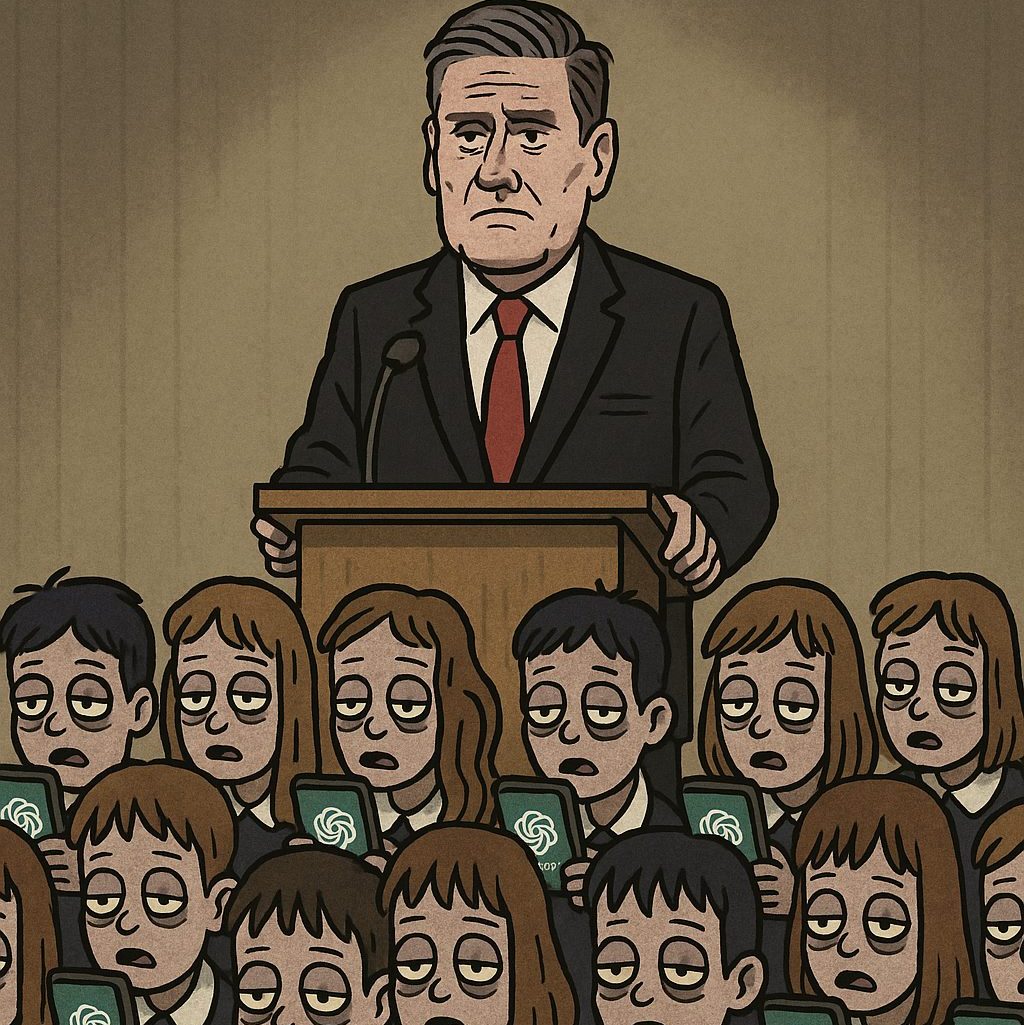
Will the UK pay for ChatGPT for everyone?
Welcome to AI Collision 💥,

In today’s collision between AI and our world:
- £2bn for ChatGPT for all
- A Wikipedia and Reddit doom loop
- The real way to spend £2bn on AI
If that’s enough to get the ChatGPT subscriptions flowing, read on…

AI Collision 💥
Picture this…
You’re in a London café, overhearing a government minister casually telling Sam Altman that Britain might just buy everyone in the country a ChatGPT Plus subscription.
A cool £2 billion a year, so that every Brit — from schoolkids in Cornwall to retirees in the Highlands — could chat with OpenAI’s bot whenever they fancied.
That was the story that broke in The Guardian last week. It wasn’t a firm policy decision, more of an idea floated in a meeting. But still, it’s the kind of idea that makes you double-take.
A nation of citizens on taxpayer-funded AI subscriptions? It sounds bold, futuristic, and also a little terrifying.
It also makes you think harder at the impact that AI could have when everyone has access to AI.
There’s an upside here, no doubt. Universal ChatGPT access would instantly democratise productivity tools that have so far been the preserve of knowledge workers and the tech-savvy.
- Students could get real-time tutoring, help with essays, or even career guidance.
- Jobseekers could draft CVs, practice interviews, and prep for skills they might otherwise never access.
- Small businesses could generate marketing copy, contracts, and customer service responses.
The government could frame it as a public good, like libraries or free school meals, a leap towards digital equity in a world where AI literacy is set to become as fundamental as reading or maths.
On paper, it sounds visionary.
But here’s where the problems come rushing in.
Let’s look at it a different way,
- Students could rely too heavily on getting answers and not learning from the process of finding answers,
- Jobseekers could end up all with the same CVs, and employers would not hire those without some sense of originality.
- Small businesses could end up with the same ads and copy as competition and find no differentiation.
I short, if everyone relies on AI too much, the world becomes the vision of what AI wants us to be.
Then, there’s the cost. £2 billion buys a lot of teachers, nurses, or fibre-optic cables. And that’s before you account for the brutal reality of scaling to millions and then billions of people. s
Software companies rarely hold prices still. Lock the taxpayer into this deal and you’re at the mercy of OpenAI’s pricing strategy for generations.
Then there’s access. Yes, broadband availability in the UK is high, 97% of households can get “superfast” speeds of at least 30 Mbps, and full fibre now reaches around three-quarters of homes.
But uptake is another story. Only about a third of households that can get full fibre actually subscribe to it. Rural Wales, parts of Scotland, and Northern Ireland lag behind London or the South East. The same goes for mobile coverage strong overall, but patchy at the edges.
So the government could hand out AI subs, but without reliable connectivity, they’re useless to a chunk of the population. That risks widening the very digital divide which becomes the wealth divide it’s supposed to close.
The scarier angle isn’t technical, though. It’s cultural.
Give every kid in Britain unlimited ChatGPT access and what happens? Homework written by AI. Problem-solving outsourced. Research skills atrophy. Instead of citizens learning how to think, they learn how to prompt.
Learning to prompt is a good thing, but that comes only with understanding how to ask the right questions, which only comes for self discovery.
We’ve already raised a generation shaped by Wikipedia and Reddit. Imagine the next one moulded by an AI whose knowledge is, at its core, a remix of Wikipedia and Reddit. A doom loop of second-hand reasoning.
And sure, today’s models are impressive. But they still hallucinate facts, overstate confidence, forget what the date and time is and pull from biased or incomplete data. Are we ready to let that shape how millions of people understand the world.
The more compelling path isn’t to buy everyone ChatGPT, but to teach everyone how to use it wisely.
Imagine a £2bn education strategy that:
- Integrates AI tools into classrooms with guardrails, so kids learn their power and their limits.
- Teaches students to fact-check, research, and recognise when AI is bluffing or simply incorrect.
- Helps adults and older workers pick up digital literacy so they can harness AI without being dependent on it.
This is where the real long-term return lies. Critical thinking, not canned outputs. Independence, not dependence.
The idea of nationalising ChatGPT access makes for a great headline and no doubt some dipstick politician might even run with it as a policy.
It would be dolled up as bold, futuristic, and fits the “moonshot” rhetoric politicians love. But it’s also economically unworkable, technologically uneven, and socially dangerous.
AI absolutely belongs in Britain’s future. It will transform schools, hospitals, offices, and government departments. But it should be deployed as a tool, not a crutch. A nation of critical thinkers, AI-literate and sceptical, will always outperform a nation spoon-fed algorithmic answers.
So yes, the UK government should invest in AI. Just not by buying everyone a chatbot subscription.
Because the future isn’t about free ChatGPT for all it’s about ensuring we don’t forget how to think for ourselves.

#AD
This man has made his followers significant returns in the last wave of the AI boom. Now, he says a new round of returns are on the horizon. But this time it will be in a different set of companies that he calls
“AI Master Key” stocks.See which companies he recommends you buy immediately.


Boomers & Busters 💰
AI and AI-related stocks moving and shaking up the markets this week. (All performance data below over the rolling week).

Boom 📈
- Kainos Group Plc (LSE:KNOS) up 19%
- Alibaba (NYSE:BABA) up 9%
- Tower Semiconductor (NASDAQ:TSEM) up 7%
Bust 📉
- Meta (NASDAQ:META) down 2%
- Nvidia (NASDAQ:NVDA) down 2%
- AMD (NASDAQ:AMD) down 3%

From the hive mind 🧠
- AI in schools maybe isn’t such a grand idea, but AI in general will be helpful and the first place it will be helpful is in the medical profession.
- I would hope that Meta does do this… can’t believe this is even an article that needs to be covered!
- Let’s not also forget that the capital flows into AI are massive still, so here’s another few hundy-milly finding its way around the AI start up world.

Artificial Polltelligence 🗳️

Weirdest AI image of the day

ChatGPT’s random quote of the day
“The computing scientist’s main challenge is not to get confused by the complexities of his own making.”
— Edsger W. Dijkstra

Thanks for reading, and don’t forget to leave comments and questions below,
Sam Volkering
Editor-in-Chief
AI Collision


Personally I find the whole prospect of AI terrifying, I’ve just read an article outlining how it is leaving the customers of companies and governments who integrate it into their systems open to fraud, abuse and hacking because the bad guys always find ways to manipulate the system.
The main problem is that the data fed into it is only as good as the information already available and it is virtually impossible to introduce a lot of human sensibilities into a machine. Hard to see where this will lead, there may be some good to come out of being able to process data faster than a human brain but I’m sceptical.
I’m actively avoiding using AI and my only experience so far is Copilot in Microsoft Office – it’s extremely annoying – I don’t need AI to tell me how to set up a document or write a letter. I won’t be using AI myself and all these chat bots on the telephone and on line websites are useless in the main – all they do is keep you busy in an answering loop till there is a person who can deal with your problem. Only marginally less annoying than interminable music while you wait.
The only plus is that it’s possible to take advantage of the investing opportunities as this spins out.
Keep up the good work in your newsletter, I always enjoy reading it!
My son writes books. He used ChatGPT to do some proof reading and sacked it for failing to do the job as well as a human reader, taking more time and being generally incompetent, unreliable and even rebellious.
I completely agree that AI tools like ChatGPT can be overused and that reduces our ability to think things through. It’s too convenient to go with what AI says instead of using it as a sounding board, or for extra insight. I find it easy to spot AI written things – it’s quite bland and average. But as humans we value convenience over almost anything so I realise that from here on in, it’s going to be AI generated content instead of human thoughts and voices.